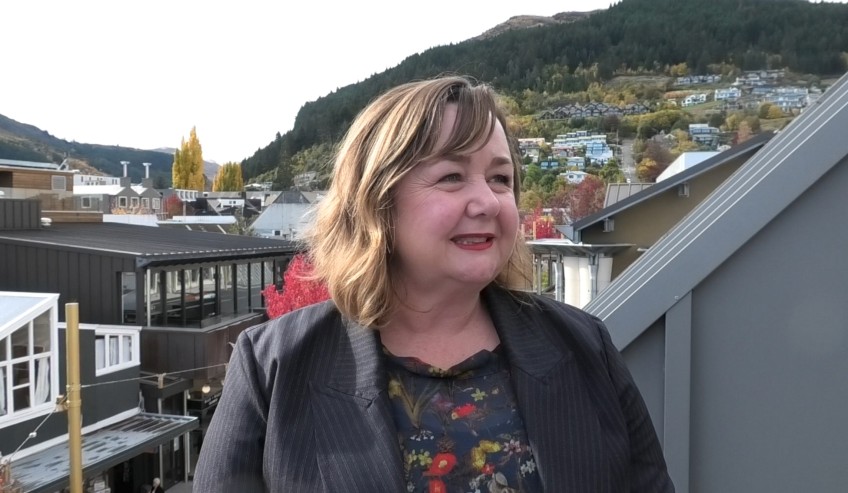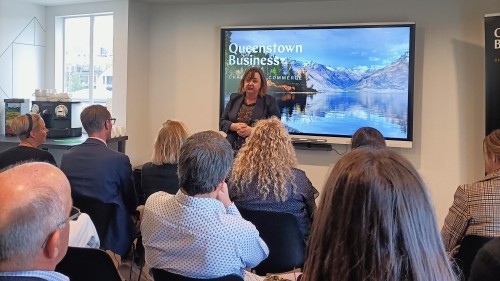Housing Minister in Qtown: no quick fixes, no miracles

The housing minister has been in Queenstown today and, spoiler alert, she hasn’t been able to deliver a miraculous quick fix to the housing crisis.
Speaking with Crux this afternoon Minister Megan Woods says the problem is nation-wide and it is decades in the making.
She wasn’t in town alone – tourism minister Peeni Henare joined her for his second visit to the district in less than a month.
On their agenda first thing, a catch up with the Grow Well Governance Group, which puts local, regional, and central government, plus iwi, around the same table to figure out how Queenstown can best handle urban growth.
Minister Woods says it is “really useful to get on the ground and have some really good conversations and hear how it is that locals want to solve this housing crisis in Queenstown”.
She says she understands the “complexity and the seriousness of it”.
Her answer: building our way out of the problem.
Watch the full interview with Minister Woods in Queenstown today.
“Our government has made it a priority to make sure we are doing everything we can to increase the supply of houses in New Zealand, but most importantly to increase the supply of affordable houses in New Zealand.”
But, a focus on "building our way out" may have misread the mood of the room with many Queenstowners wanting to see a more multi-layered response to what the minister herself is acknowledging is a complex issue.
Deputy mayor Quentin Smith was at this morning’s meeting, and he says some of the conversation centred on demand versus need.
The deputy mayor says the minister has committed to going away to engage with the available data – her staff have been looking at the number of rental bonds, and that's been fairly static, he says she told the meeting.
But, they expressed a keenness to better understand what is happening here - how many rentals are there and are more coming onto the market as fresh houses are built? Then, if not, why not, and what can be done about it?
He says it is invaluable to have two ministers in town “engaging with the issues with us”.
“I think that people should take some encouragement from the fact that they're here and talking to us, and trying to partner with us on solutions.”
But the system is not “particularly agile”, he says.
“It’s fair to say there's no immediate solutions to the worker’s accommodation crisis.
“It’s super complicated because we've got everything from Waka Kotahi to the Ministry of Education to regional council - all the different parties in the room… But it is all being done in good faith to try and address the problem.”

While the minister talked money for roads, pipes and public housing, business people in Queenstown wanted to talk immediate levers to respond to what they see to be an acute rental shortage.
The ministers also fronted a room full of business people at a talk organised by the Queenstown chamber of commerce, and many of those in attendance had also been hoping for some quicker-turnaround solutions to the housing squeeze.
Council candidate John Glover, who was at the chamber meeting, says “there was a lot of passion in the room”.
However, he noted a disconnect between what those in the room were hoping for and what the minister was selling.
While questions from the floor were focused on fixes for an “immediate, urgent need”, the housing ministers’ tool box was aimed at building more houses, and the associated infrastructure, to pull the district out of the problem.
“I don’t think that was what the audience necessarily wanted to hear.
“Everyone is looking for something that’s going to make a difference right now for the people who are sleeping in cars or who are leaving the district.
"It's a wicked problem and it doesn't have an easy, straightforward answer."
Mr Glover says he asked the minister a question about what levers central government could engage to better regulate Airbnb and other short-term accommodation provider platforms. There is nothing immediate to announce.

John Glover - noted a disconnect between the mood of today's meeting and what the minister was selling.
Meanwhile property managers in attendance voiced their frustrations at what they see as restrictive tenancy arrangements preventing flexibility around a rental home being able to be vacated for owners to use at limited specified times throughout the year.
Talking with Crux, Minister Woods says she does want to “get the balance right” on legislation protecting tenants.
If there genuinely is a mass of landlords locally that want to help out in the current crisis and “only want to rent for say six months and there’s a pool of seasonal workers here in Queenstown that we could do some matching with” then there may be some things that can be done, she says.
She is committed to working with local partners to find solutions, and that’s what today’s conversations are all aimed at, she says.
“We don’t set up things like urban growth partnerships with local councils and mana whenua to dictate what those solutions are going to be. Part of my reason for being down here is to hear what those local solutions will be.”
Meanwhile, there are some who have voiced their disappointment at not having had the ear of the minister – among them councillor Niki Gladding.
Despite asking, she says she was declined the opportunity to attend this morning’s think tank hosted by the council either in person or virtually – attendance was restricted to the mayor, deputy mayor and some council staff.
“Internally, before that meeting, we haven’t actually had any sit-down discussion with Quentin and Glyn about what all the councillors think and would like to get across to the ministers.”
She acknowledges the ministers “need to get to grips with the issues and they’re not going to do that quickly”.
“I’d like to see them engage with all elected members - it’s not all about what the mayor is saying.
“I think that’s really important for building the relationship between central and local government and supporting local democracy.”
Like others, she thinks the minister is wrong to think Queenstown can build its way out of its current mess, she says.
“We know the causes of the problem here, and we know that if we just increase supply, we're just going to be supplying more residential visitor accommodation, more empty homes that investors can sit on or people can use as a bolt hole and just fly down for the weekend.”
While local government can within its mandate address “two or three symptoms” of the housing crisis it does not have the tools to address the cause of the problem and that is where central government needs to step up, she says.
“We can do some things to help but, actually, this is a central government problem and central government needs to come to the party, because it's the only equitable way to address it.
“At the end of the day, we have to address the fact that our economy is propped up by our property market, and there's a reluctance to tweak that for fear of all of it, the house of cards, falling over. But we have to question that."
She doesn't want Queenstown to hide its current rental crisis beneath any sort of flashy veneer.
“The crisis needs to be allowed to play out in the open…and we need to not be hiding it out of fear that no one comes here. I think council needs to be shouting loud and clear: ‘These are the problems our people are facing and it's a struggle'."
Main image: Housing minister Megan Woods in Queenstown today, Tuesday, April 18.


























